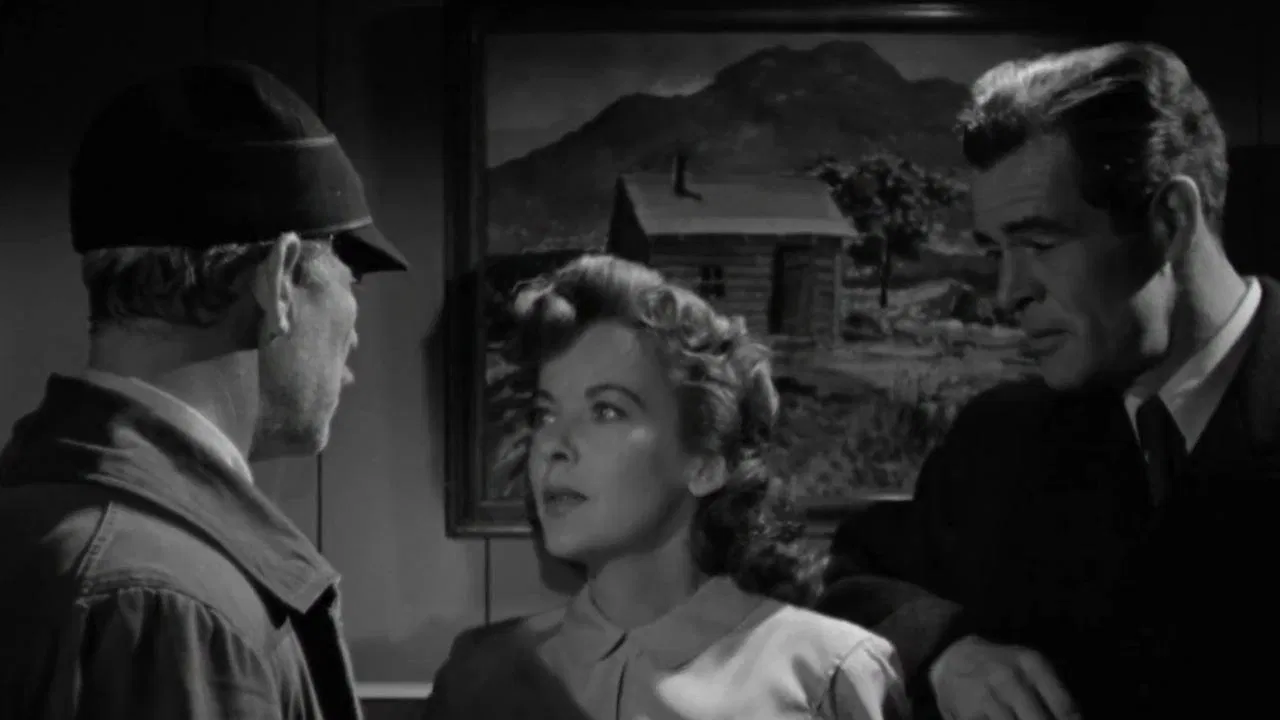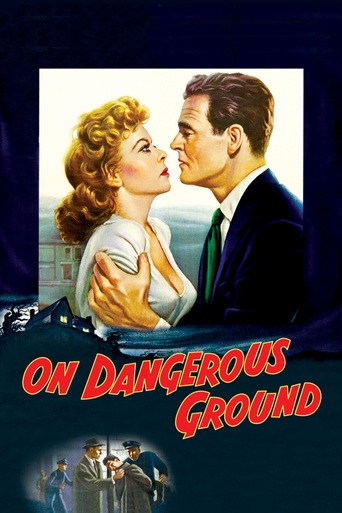

... and as such the success of "On Dangerous Ground" is no accident. Some of the major "players" here were creating some really good stuff, years 1946 to mid-1950s. The late 1940s and early 1950s were the peak directorial years of director Nicholas Ray. Ida Lupino, who was partnered with Ryan in another noir was a great actress and one of the most under-rated directors of the 1950's. I was also quite struck by the haunting Herrmann score, (especially in the Lupino scenes) and A.I. Bezzirides & Nicholas Ray's well written main character, George E. Diskant's dramatic b & w cinematography, and Robert Ryan's splendid acting.This film confirmed for me something about Ryan as an actor: no matter what, he never pandered to the audience's desire to like him. He refused to let his guard down or to have his character manipulate us into thinking, "Ahhh, he's really a nice guy after all." One can never be sure with Ryan.The movie starts off in a dark, dreary atmosphere as Robert Ryan's character is a withdrawn, heavily-tempered street cop who is about to lose his job if he doesn't control himself from roughing up suspects. It is agreed that he go on assignment in a rural area where a young killer is on the loose. The trail leads up to an isolated area of snowy mountains. He then meets Ida Lupino's character, a lonely and dependent blind woman.I enjoyed the economical way that we are shown the families of his co-workers briefly, as when one of the cops, a father, who is watching TV with his growing brood, silently goes into the bedroom to get dressed for work - his wife helps him to prepare his "armor", physically and mentally - and then he goes down to the waiting car. In marked contrast we see Ryan, already looking as though he has indigestion as he eats his lonely meal in a bleak room illumined by a few paltry objects that tell us quite a bit about Ryan. There's his athletic trophy, his crucifix on the dresser, and what's he studying while he eats? Police pictures of known criminals. Perhaps that disgusted expression on Ryan's face is self revulsion - not just a dogged determination to burn those grim features into his memory.There is a reflection of Ryan in the two people he's with once he's exiled from the city to the country to help find the boy killer. Ryan's more humane instincts are embodied by the protective, gentle, blind Lupino character and every blessed, brutal impulse in him is personified by Ward Bond's grieving, frantic, blundering father hell-bent on revenge- - forget all that stuff about understanding .In one of the more harrowing scenes during the burnt out Ryan's brutalization of a suspect, he cries out to the guy he's pummeling, "Why do you make me do it? You know you're gonna talk - I'm gonna make you talk. I always make you punks talk! Why? Why?" Does he really expect an answer, except in his own soul? The end of the movie was softened under alleged pressure from the studio for a more conventional, redemptive ending, but I don't think that the future's going to be all lollipops and rainbows by any means.Oh, and there are some nifty little parts filled out quite amply by a very young Nita Talbot as an underage bar girl and Olive Carey as the stoic mother of the murdered girl. It's a fine film, well done, and highly recommended.
... View MoreA solid, character-driven film noir with some great location photography, ON DANGEROUS GROUND proves to be a fitting addition to an overloaded genre. This is a film of two halves, starting out as a typically tough, two-fisted detective story about a cop with a penchant for violence (played well by Robert Ryan). Around the halfway mark, the action shifts to the icy, wintry, countryside (shades of both FARGO and INSOMNIA here) and the pursuit of a killer.ON DANGEROUS GROUND is blessed with a decent script and some solid performances from both Ryan as the incredibly tough lead and Ida Lupino as the blind woman who might well hold the secret to the killer's identity. Lupino is on particularly strong form here, putting across her character's fragility mixed with a particular toughness all of her own. The cinematography is very good, with some great chases in the snow, and Bernard Herrmann's score only adds to the experience.
... View MoreDirector Nicholas Ray had a penchant for themes of alienation and loneliness. With "On Dangerous Ground", he positions his principal players with conditions that isolate their loneliness in contrasting ways. Detective Jim Wilson (Robert Ryan) stands apart from his fellow officers by virtue of internalizing his job, creating in himself a distrust of all humanity. When he meets Mary Malden (Ida Lupino), he finds her to be isolated by her blindness, living alone with her mentally challenged brother in a remote small town some seventy miles north of the City.If this was going to be about simply catching the killer of an innocent young girl, it could have been handled in the first half of the film when we first see Ryan's character as the hard boiled and cynical street cop. He's still that same cop when he arrives in Westham, but over time a curious transformation takes place. There's a fleeting moment when the detective observes Walter Brent (Ward Bond) in a rage over his daughter's murder and vowing to blow the killer away. It doesn't last long, but in that brief moment Wilson sees himself with all the hatred and confusion that's built up inside himself after eleven years as a cop.Film noir fans will be engaged by the first half of the picture - gritty city nightscapes and tough cops scouring the streets for thugs and low-lifes. The bar scene exploits an underage trashy hooker who makes a pass at Ryan, and gets the old heave-ho in return. The noir feel is maintained to a degree in the latter half, as much of the story takes place in Lupino's darkened home. Then the chase for Mary Malden's brother occurs over a snow covered landscape in sharp contrast to typical noir sensibility.I don't know if I'm buying the resolution to the story all that readily. Mary didn't seem all that distraught that her brother died, especially after Wilson vowed his help in securing his safety. And I'm not convinced that Wilson would have turned his entire life on a dime to return to Mary and give up the big city life. But oh, that closing moment, that's what stays with you as Jim and Mary embrace in a happy ending that defies all probabilities. Ryan and Lupino have a way of making it look credible.
... View MoreRobert Ryan plays a sadistic cop from the big city who loves beating the crap out of suspects. His captain (Ed Begley) sends him out to the country for a while to help investigate a murder there, but the murder victim's father (Ward Bond) has already discovered the culprit, plans to kill him and doesn't want Ryan to get in the way. No problem for Ryan, that is until he meets up with the murderer's blind sister (Ida Lupino), who melts his hard heart. This film starts off well - Ryan in particular is just great in it. But, as much as I love Ida Lupino, her character and her blind act are pretty corny, and I just don't buy Ryan's quick change of heart (well, my guess is he probably just wants to get laid, but this is 1952 and they can't just come out and say that). Nicholas Ray's direction is very good.
... View More